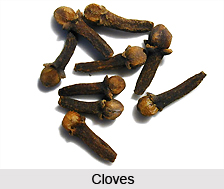 Clove oil which is one of the oldest essential oils is derived from a plant that originally comes from India. Clove is also known as `Lavanga` or `Launga`. It is enriched with vitamin C, potassium, iron, phosphorus, calcium, sodium and vitamin A. Clove oil is commonly used in India for myriad purposes ranging from daily life to medicinal usage.
Clove oil which is one of the oldest essential oils is derived from a plant that originally comes from India. Clove is also known as `Lavanga` or `Launga`. It is enriched with vitamin C, potassium, iron, phosphorus, calcium, sodium and vitamin A. Clove oil is commonly used in India for myriad purposes ranging from daily life to medicinal usage.
The American Dental Association has approved clove oil as an anesthetic and it is traditionally used for toothaches. Since, it is very strengthening to the musculature, it is also traditionally recommended that expectant mothers consume cloves in the last month of pregnancy to tone the uterus and prepare it for the birth pro dilution. Clove oil has a warm, strong, spicy smell and the oil is colourless to pale yellow with a medium to watery viscosity.
Types of Clove Oil
There are three types of clove oil.
Clove Bud Oil: Both analgesic and antiseptic, clove bud oil is derived form the flower-buds of S. aromaticum. It consists of 60-90% eugenol, eugenyl acetate, caryophyllene and other minor constituents. It can help eliminate and prevent disease and infection.
Clove Leaf Oil: It is derived from the leaves of S. aromaticum. It consists of 82-88% eugenol with little or no eugenyl acetate, and minor constituents. It is used to relieve pain, sore muscles, disinfect, and repel insects.
Clove Stem Oil: It is derived from the twigs of S. aromaticum. It consists of 90-95% eugenol, with other minor constituents. It is used to relieve arthritic pain, toothache and mouth sores. It can be used as a mouthwash to maintain healthy gums.
 Therapeutic Properties of Clove Oil
Therapeutic Properties of Clove Oil
The therapeutic properties of clove oil are analgesic, antiseptic, antispasmodic, anti-neuralgic, carminative, anti-infectious, disinfectant, insecticide, stimulant, uterine and tonic. Clove oil can be mixed well with the following oils: Cardamom, Cinnamon, Lavender, Ginger, Orange, Vanilla, Rose, Clary Sage, Bergamot, Bay Leaf and Ylang Ylang.
Uses of Clove Oil:
•Clove oil can be used for acne, bruises, burns and cuts, keeping infection at bay and as a pain reliever.
•It helps with toothache, mouth sores, rheumatism and arthritis.
•It is beneficial to the digestive system, effective against vomiting, diarrhoea, flatulence, spasms and parasites, as well as bad breath.
•Clove oil is valuable for relieving respiratory problems, like bronchitis, asthma and tuberculosis.
•Placing a few drops of clove oil on a cotton ball and then placing the cotton ball in a linen cupboard will not only fragrance the cupboard, but will help to keep fish moths at bay.
•Clove oil also decreases the male sensitivity, as an aid in premature ejaculation.
•Clove can be used for adding flavour to cough medicines and cold remedies.
•Clove leaves can be used in cooking for adding unique taste to the dishes.
•Clove oil is used in many cosmetic products that are made specifically for reducing the appearance of stretch marks, baggy eyes and puffy skin.
Side Effects of Clove Oil
•Taking too much clove oil with cough medicines at one time can be life-threatening or it can cause severe breathing problems.
•Taking in large amounts may also cause nausea, vomiting, abdominal pain, diarrhoea, burns in the mouth and throat, and sore throat.
•Rapid heartbeat, sleepiness, intestinal bleeding, and liver or kidney failure is also the result of taking excessive clove oil.
•Severe reactions may occur in people with allergy to cloves.
Clove oil can be made at home by mixing some household ingredients and clove. It is also readily available at the local grocery stores and the stores that specialize in all-natural products in the vitamin section.




